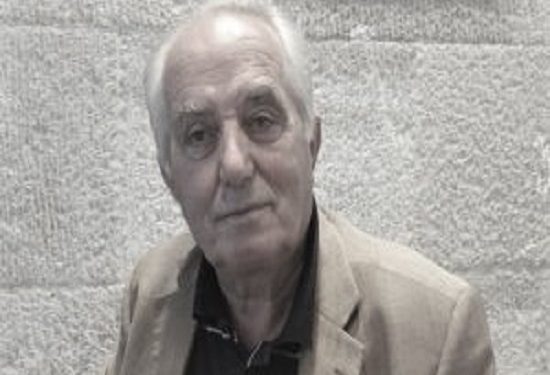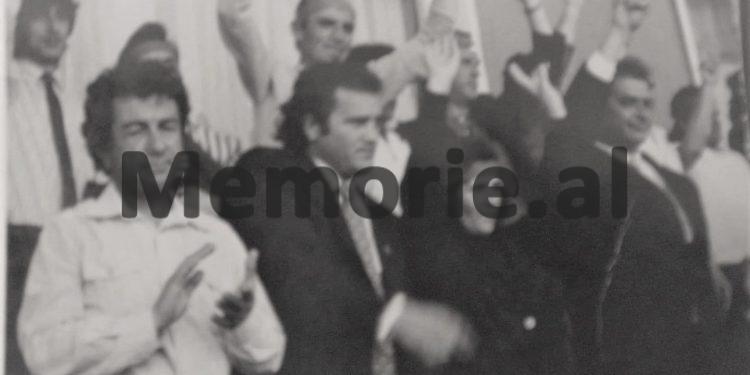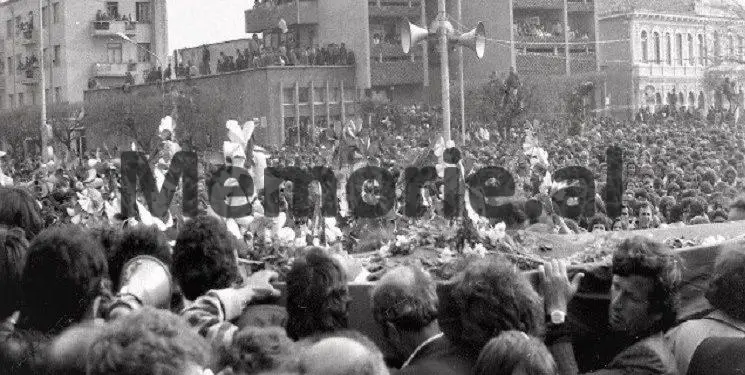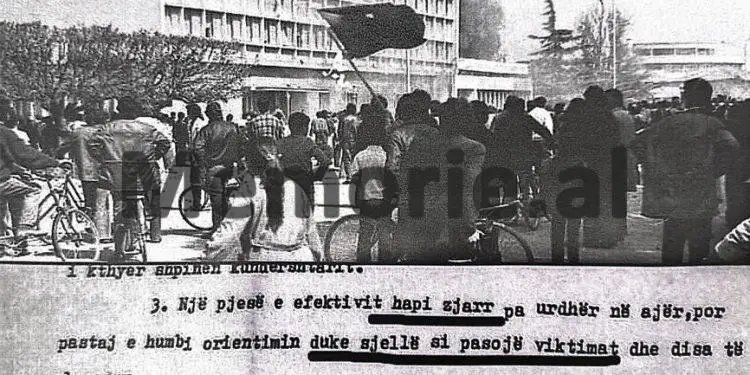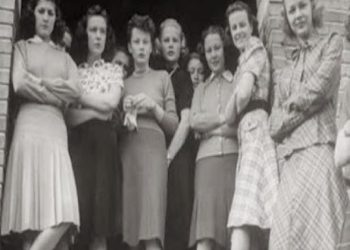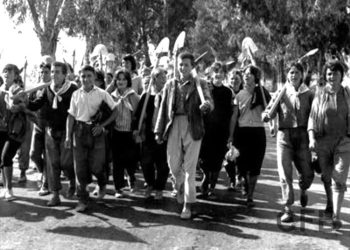Tanush Mulleti
The third part
Reflections: “How I saw it, heard it and touched it on April 2, 1991, and how I hear it today”!
Memorie.al / April 2, 1991, has entered the history of Albania and is accepted even today by all wings of politics, as a monstrous and macabre crime, where 4 young boys were killed and over 97 people were injured, some of who remained disabled all their lives, all young men and women (as Umberto Eço says: “The truth and only the truth will save us”). The reason for writing these reflections is that we are hearing and reading, intentionally or unintentionally, the history of the event of April 2, 1991. For these notes, I was not driven by hatred, nor revenge, nor ambition, nor interest, but only conscience to tell the truth, publicly, as it happened.
Continues from last issue
Afterwards, Shaqir Vukaj says that: “The protesters were calmed down by some intellectuals and the library was saved by the police”. This is not true at all. I mentioned above that the city library was saved by some intellectuals and the director of the library at that time, Skënder Beci, a liberal man, who had a good reputation in the city of Shkodra and brought out two or three carts with the works of Enver Hoxha. which were burned by the protesters and the situation calmed down. There were no policemen at the premises as they abandoned their duties by order after the burning of the Party Committee.
Similarly, Radio-Shkodra was not saved by the Police and its Director Gëzim Podgorica, since when Besnik and I went to Radio-Shkodra, after the burning of the Party Committee, there were no more policemen in Shkodra. Radio-Shkodra was saved by me and Besnik Komi, on behalf of the Independent Trade Union.
The director of Radio-Shkodra, according to Shaqir Vuka, has done a good deed, reducing the power of the antenna from 24 KW to 1 KW.
At Radio, there were many employees and not four people, as written in the book. Secretary of the Party Committee Xh. G was saved the first time by the physical education teacher, Ll.V., while the second time, armed civilians (of the police) intervened.
According to this, the director has violated the law on public information (we were in pluralism), and Azem Hajdari is also blamed for this event. But Azemi was not in Shkodër at all. The people of Shkodra did it themselves, they did the gunshots that were heard and gathered the people. The slogans, according to Shaqir Vuka, were: “Down with communism”! “Oh, Ramiz, oh hound”! “Shkodra Republic”! I have not heard: Oh, Ramiz, oh hound! Why?! Because a part of the people had faith in Ramiz Alia again.
I have heard even worse, a poem that said: “Sllobodan, oh Slobodan, teach in Tirana, because you have us all at your side”. The people were morally and economically exhausted. Hell, only communism and Stalinism should be removed from Albania.
“Shkodra Republic”, is used as an expression in Shkodër, for someone who is special, who is in his job. But we must add that, compared to other cities, Shkodra is special, not only in art and culture, but also in political, historical, economic life, etc. Coincidence made April 2. The change would happen (the last domino would fall), and it is understandable that the main center would be Shkodra. Rightly, the philosopher, Montesquieu, says: “In chance is God”. There it started, there the crisis; that is where the Stalinist and Enverist terror began and ended there, on the population of the Shkodër district.
Aredin Shyti, (his book, page 126), asks the question: “Neither I from Tirana nor Çapajevi and Dilaveri, who were in Shkodër, could give an answer to the question: where did this anger come from?”
Anger and distrust towards the Labor Party and the Home Office was early. From 1945 to the 1990s, over 600 people were shot with or without trial, the terror was very strong, houses were burned, many people were imprisoned and interned with their families. There is no street in Shkodër without an internet or prisoner. We are only taking the last two years of the communist regime to show what happened in Shkodër:
On August 24, 1989, Gjon Mark Kumbullaku (25 years old) and Dod Fran Gjerkaj (22 years old), while trying to cross the border in the place called Suka-Dajç, were caught by the border forces and surrendered with their hands up. They were killed by the troops of the Border Unit. In order to terrorize the people, they are tied with barbed wire, behind the back of the car, half-naked, walking around Shkodra and villages, etc. This is a desecration of the corpse, condemned by the Penal Code of that time.
On pages 41-43 of Aredin Shyti’s book, he tells the event that we are quoting in full: “The Supreme Court upheld the decision of the Court of First Instance. The minister said that the Presidium of the People’s Assembly had not accepted their request for forgiveness. therefore, he said, they should be shot tonight, in the Kombinati area (T.M. Note: Kombinati Tekstil “Stalin” Tirana) and the corpses should be left in place, for the citizens to see in the morning. I’m sorry, – I told the minister, – but this cannot be done”…
…As soon as I told him that such actions are contrary to the functions of the state, his face became angry. It was the reaction of a powerful man who values his knowledge at the same height as the throne he is sitting on. But, perhaps more than the chalamane ethics of my answer, that the functions of the state were listed in the course text: The Theory of the State and Law… showed that, it continued to be believed that demonstrations with corpses of people shot by court decisions, would bring success in the fight for crime prevention…!
… In two or three cases, one of them in Shkodër, the corpses of people killed, trying to cross the border, were exposed to be seen by as many people as possible. How serious is the error committed, is determined by the consequences it brings? And the consequences were very serious. People were right to despise the act and its enforcers. The waves of hatred for Çapajev Tachi (after he was taken as a defendant for the event of April 2, 1991), were fueled precisely by the mentioned case…! Any other procedure outside the norms for any purpose would have to be legally assessed rape of the corpse…”!
On April 20, 1990, two young people, Dhurata Sokoli (25 years old) and Elez Kraja (26 years old) were caught far from the border by the Border Unit. The commander stripped them naked and ordered the soldiers to sexually abuse them and then execute them. The regime decorated and promoted him, making him commander of the Border, of the Port of Durrës. In 1993, the commander was arrested and sentenced to 17 years. The soldiers admitted the crime. In 1997, he left Albania.
On May 18, 1990, two brothers, 25 and 27 years old, Gjekë and Vatë Beqi, from Velipoja, tried to cross the border by swimming. They are shot with a machine gun in the water, by the border unit, and one is seriously injured. They were brought ashore by the commander of the Border Point, Bino Binaj (from Vlora), contrary to the prayers of his soldiers, as well as the law that came out on May 8, 1990 (Crossing the Border is no longer considered high treason against the homeland, but simply as a criminal offense), shoots him with his machine gun and kills Vata on the shore. After some time, the commander was sentenced in absentia to life imprisonment. But he also left Albania in an unknown direction.
On December 13, 1990, the 16-year-old boy, Olsi Lorja, who crushed the head of Enver Hoxha’s torso with a hammer, in order to escape arrest, went to the border and was killed by the border unit on December 20, 1990. .
On June 16, 1990, the 16-year-old boy Pllumb Pllumbi was killed at the border.
On June 12, 1990, Nini Rrok Hoti was killed in Zogaj.
On October 7, 1990, Agron Ismail Hoxha was killed at the border.
On December 2, 1990, Ndue Luk Markaj was killed. We add here the arrests and punishments of January 14 (for the attempt to remove the bust of Stalin) and of December 13 (for the removal of the bust of Enver Hoxha).
All these murders were committed by Ward 299 (of the Border), in violation of the law. The investigation, after conducting the investigations, the criminal case was dismissed based on article 18/11 of the Criminal Code, Chairman of the District Investigation, Kosta Karanxha.
Aredin Shyti, (in his book, pages 151-152), presents the telephone conversation with Ramiz Ali:
“They told him that, I had accepted at the meeting of the Executive Committee of Shkodra, that; the police were responsible for the murders, that they had exceeded their powers…!
…I continued to defend myself against the incorrect information and explained that I could not say, not even in front of my friends or anyone, that the police or anyone else killed the people. I would say so if I had proof. The debate raged that, in the information of the Interior Branch, the order of the episodes of the event had been changed. That information was reflected verbatim in the Ministry’s communique. For this, I took responsibility. Ramiz Alia, intervened. He asked me for an explanation and I told him, approximately, that the mention of the episodes in that order was wrong and should have come from carelessness, influenced by the perception that the creator of the information had, about the importance of the events that happened on April 2. “You are keeping him healthy”, the President told me. “Please, friend Ramiz…”! I didn’t finish the speech that he made a “correction”, of what he said. He expressed his displeasure with the words “it shouldn’t have happened like this”!
…That afternoon, Ramiz Alia called me and asked me: “How did you say that word, about competences”?! “I don’t remember, when is it about”, I asked him. He was with others in the office and asked them about something to help my memory. I remembered them and said: “Isn’t it about crossing the limits of the necessary protection or extreme necessity”? He said that that’s exactly what he was asking about and the conversation between us ended…”!
The text of the statement was broadcast by the mass media in the evening of that day and was described as: “Communication of the General Investigation”. After two or three days, the arrest warrants signed by: General Prosecutor, Rrapi Mino for Çapajev Taçin, Dilaver Paparen and Gjek Çelaj came. Aredini and the minister, Gramoz Ruçi, did not agree with the arrest decisions and returned them.
Aredin Shyti, page 196: “On July 25, 1992, I was arrested at the workplace, at the Order Academy. In the evening, the news that was given in TVSH was built to convey the news that the killer of April 2 was discovered. The time was chosen, the next day on July 26, the local government elections were held”.
This is what Gjek Çelaj writes about the events of April 2, pages 28-29:
“In the summer of 1990, I was informed that the Ministry of Internal Affairs had decided that I should be transferred from Puka to Shkodër, with the position of deputy chief of the district police…!
…Just like ten years ago, when I had gone to Tirana to continue the Academy of Public Order, without any great desire…!
… The district police were headed by a chief, who was not a real police officer, but who, after the Faculty of Economics, had graduated by correspondence from the Academy of Order, which at that time was called the Higher School of the Ministry of Internal Affairs.
He was a serious man with a desire for work, he was honest, smart and uncompromising, but not too decisive and determined to lead the Police of a district like Shkodra. Anyway, Dilaver Papare, remained a good police officer…!
…When I moved to Shkodër, at the head of the Department of Internal Affairs, there was Çapajev Taçi from Gjirokastra, an experienced cadre of the State Security and as a leader, but with limited skills, to run the work efficiently. He was a correct and serious framer and prone to patterns of idle chatter. He stayed up to 15 hours a day at work, but without doing anything concrete and effective. He belonged to those types of managers who often repeat to subordinates that they need to work harder, without ever telling them what needs to be done specifically…!
…On January 14, 1990, a demonstration was organized in the city of Shkodra, for the removal of the bust of J.V. Stalin. Since the Department of Internal Affairs had arrested the organizers the night before, the demonstration had failed, but the party and state authorities of that time had been forced to remove the bust of the Soviet dictator that very night…! Discontent had erupted everywhere…
(Note T.M.: Actually, about 400 people were arrested and tortured during the investigation, both in Shkodër and Tirana. Rin Monajka was hit on the head, and in 1993, he died in a hospital in the city of Villach, in Austria; T. Curani, from the torture, jumped from the second-floor window, breaking his hands and feet; Viktor Martini, in his book, testifies to the torture they did to him when they took him to the Psychiatric Hospital of Elbasan. Similarly, Dom Simon Jubani, in his book: “My prisons”, writes about the arrests and tortures of January 14; P. Veli tells about the injections they gave him in the Psychiatric Hospital in Elbasan. The miracle happens, the Labor Party itself removed the bust Stalin in Shkodër, the arrested continued to be kept in the Psychiatric Hospital of Elbasan. Also, the Labor Party removed the last monument to Stalin in Europe, which was in Tirana, meanwhile, other convicts continued to be in prisons accused of attempts to remove Stalin’s bust and were released only on March 30, 1990, two days before the elections).
Aredin Shyti, in his book, continues: “…The bodies of Internal Affairs, apparently, with dictation from above, had committed an act as shameful as it is reprehensible. After they had killed two young men crossing the border, they had placed both corpses in an open military car and had driven them through the villages, to frighten and terrorize anyone who might think of leaving the country that way…!
…On September 11, 1990, some people hijacked the border force boat where the Buna River leaves Shkodra Lake and crossed into Yugoslavia. The border forces had not been ready at all, but some villagers from the village of Zogaj had shot with rifles at the boat sailing in the lake, and, as we found out later, unfortunately, they had killed a 5-year-old child.
…During the time that I would serve the sentence of deprivation of liberty in Tirana, Bënçë and Lezhë, I would have the opportunity to meet and spend time with more than half of the former Political Bureau of the APS. Unfortunately, most of them radiated neither broad culture nor strong character.
With few exceptions, they did not exceed the average cultural level of any senior diplomat and had major deficits in character. I am convinced that some of them did not have any ideals and that, in the high party and state hierarchy, only blind obedience to everything that “The Great One” said and did had led them. Only if you got to know them closely, then you would understand more clearly why the 90s found Albania so economically and morally stagnant…?!
…All the means to cope with such a situation were lacking, but, above all, there was a lack of people capable of this work. Neither the police force nor the cadres were prepared for this type of activity. Why? That no one in Albania had thought that such acts would ever happen in this country, even, until then, they were considered by official propaganda, as: “phenomena of the bourgeois world and capitalism”. Such a topic had never been addressed, with future cadres at the Academy of Order, and no one knew how to act concretely…!
(Note T.M.: Çapajev Taçi, had a health card, due to mental health problems (A. Shyti, page 277).
…Some time ago, a military department of the Ministry of Defense was made available to us, to be used in these cases, but it consisted of cadres and soldiers completely unprepared for this field of police activity. The only adjustment made to them was changing their uniform from khaki to blue and giving them a rubber baton in hand…!
…On the evening of December 13, some special forces arrived from Tirana with the task of helping the Shkodra police to arrest active participants in terrorist acts. After receiving the data from the police officers who were able to identify the active participants in criminal acts, a list was drawn up, with about 80 names, and after 24:00, they began to find and arrest them in the Department of Internal Affairs.
That night and the following two days, most of the suspects were found and detained. But, after intensive investigations, only 30 of them were arrested. The accused would have a quick trial, within a month, and would be sentenced by the district court, with deprivation of liberty, with measures ranging from 1 year to 25 years. The charges were for terror, diversion, indecent behavior in society, illegal assembly, etc. It is strange that, as the myopic and rotten state of Ramiz Ali, even after announcing political pluralism, it punished the perpetrators of destruction with political articles, such as diversion, when they had violated many other articles… (page 46 Gj. Çela )
(My note, T.M.: On December 13, 1990, there was talk of acts of vandalism, such as: breaking some shop windows in the “Parruca” neighborhood in Shkodër. We must remember that the Special Forces that came from Tirana and the tanks that came from Melgusha, took the situation under control. The breaking of shop windows was done to give the protest a vandalistic and ordinary note, meanwhile, it was said that those acts were undertaken by the State Security itself. The next day, on December 14, Arben Imami, representative of the Democratic Party at that time, came out in a statement, that; the Democratic Party distances itself from the acts of vandalism, without conducting an investigation, to discover the truth).
…After I informed him about the situation, I told him (Note T.M.: Head of the Çapajev Taçi Branch) it would be good to send us some policemen with a megaphone and 10 combs of automatic cartridges…!
…I asked 3-4 policemen to go to the location of the megaphone and the ammunition, but they shrugged their shoulders in confusion and did not speak…!
…I thought the policemen or the soldiers would have been killed. The old lady of that house escorted me to the gate of the courtyard and, after greeting her, she said: “This is the house of Tahir Kastrati” … (page 87m Gjek Çela)
… “This crime is organized, it is a state crime”, he demanded accountability and put pressure on justice: “Why is there no action against the bodies of violence, who have been trapped in the offices of the ALP Committee in Shkodër”?! .(page 100 Gjek Çela, for Neshat Tozaj)
…Perhaps this was the reason that I received with indifference the advice of my friend and colleague, police officer R.K., who, on April 18, told me: “Doctor, I am completely convinced that you are innocent, but don’t trust them too much, because they can also do illegal actions against you, as their goal is to calm the opposition that refuses to go to the parliament”… (page 101, Gjek Çela) .
…When we passed the gate of that institution, I met another investigator of that investigation, N.T. He was from Puka and I had known him for several years. He asked me where I was going and then pulled me aside and said: “Don’t be too loud, but find a lawyer and don’t accept to be questioned without his presence”… (page 103 Gj. Çela).
…Meanwhile, investigator Bejko opened his bag, with trembling hands, took out a document from it and held it out in front of me on the table. I glanced at it and saw that it was the decision of my arrest, signed at the bottom by Bejko and approved at the top by the State Attorney General, Rrapi Mino. It was an unexpected and shocking thing for me.
I immediately stood up and, addressing the prosecutor’s investigator, I said to him: “You, Rrapi Mino and Ramiz Alia, are criminals who seek to imprison innocent people, to calm the political situation, but I am telling you that, so you will achieve nothing and you will fail shamefully, because I will be able to prove my innocence at any time”. The investigator was sitting and did not speak at all, while the prosecutor approached me carefully, supposedly to calm me down, and with his hands around my waist, brought me closer to him, saying: “Calm down, I don’t believe you stay long, as let this situation pass”!
(Note T.M.: On April 26, ’91, Gjek Çelaj was arrested. Later, Xhemal Demylja, first secretary of the Shkodër Party Committee, in the capacity of Commander of the District Defense Staff, was also arrested. This accusation is absurd since we were in Pluralism and these titles had fallen automatically. At this time, in Shkodra it was humorously said: “They found two maloks from the North, to blame them, although Shkodra is 15 m. above sea level) . Memorie.al
The next issue follows




